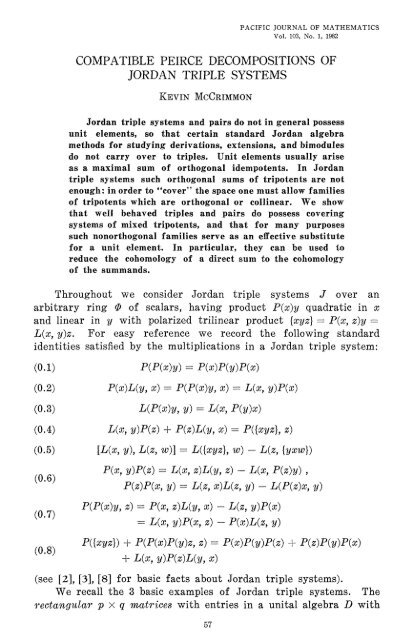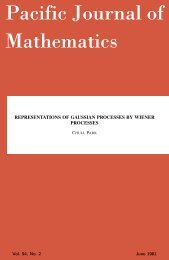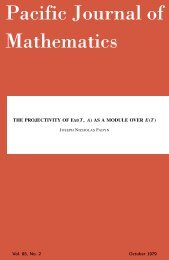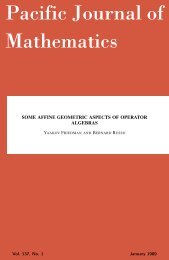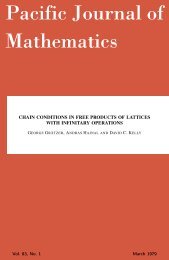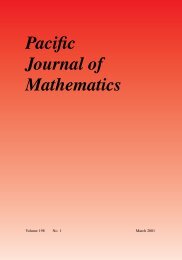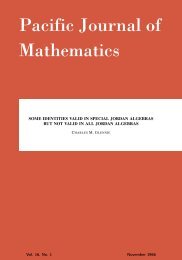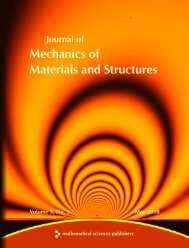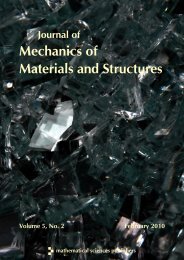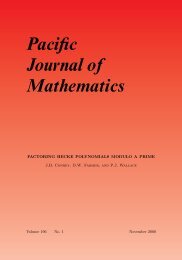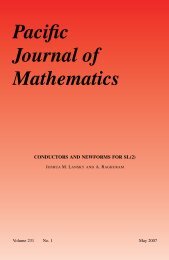Compatible Peirce decompositions of Jordan triple systems - MSP
Compatible Peirce decompositions of Jordan triple systems - MSP
Compatible Peirce decompositions of Jordan triple systems - MSP
You also want an ePaper? Increase the reach of your titles
YUMPU automatically turns print PDFs into web optimized ePapers that Google loves.
PACIFIC JOURNAL OF MATHEMATICS<br />
Vol. 103, No. 1, 1982<br />
COMPATIBLE PEIRCE DECOMPOSITIONS OF<br />
JORDAN TRIPLE SYSTEMS<br />
KEVIN MCCRIMMON<br />
<strong>Jordan</strong> <strong>triple</strong> <strong>systems</strong> and pairs do not in general possess<br />
unit elements, so that certain standard <strong>Jordan</strong> algebra<br />
methods for studying derivations, extensions, and bimodules<br />
do not carry over to <strong>triple</strong>s. Unit elements usually arise<br />
as a maximal sum <strong>of</strong> orthogonal idempotents. In <strong>Jordan</strong><br />
<strong>triple</strong> <strong>systems</strong> such orthogonal sums <strong>of</strong> tripotents are not<br />
enough: in order to "cover" the space one must allow families<br />
<strong>of</strong> tripotents which are orthogonal or collinear. We show<br />
that well behaved <strong>triple</strong>s and pairs do possess covering<br />
<strong>systems</strong> <strong>of</strong> mixed tripotents, and that for many purposes<br />
such nonorthogonal families serve as an effective substitute<br />
for a unit element. In particular, they can be used to<br />
reduce the cohomology <strong>of</strong> a direct sum to the cohomology<br />
<strong>of</strong> the summands.<br />
Throughout we consider <strong>Jordan</strong> <strong>triple</strong> <strong>systems</strong> / over an<br />
arbitrary ring Φ <strong>of</strong> scalars, having product P(x)y quadratic in x<br />
and linear in y with polarized trilinear product {xyz} = P(x f z)y —<br />
L(x, y)z. For easy reference we record the following standard<br />
identities satisfied by the multiplications in a <strong>Jordan</strong> <strong>triple</strong> system:<br />
(0.1) P(P(χ)y) = P(χ)P(y)P(χ)<br />
(0.2) P(x)L(y, x) = P(P(x)y f x) = L(x, y)P{x)<br />
(0.3) L(P(x)y, y) = L(x, P(y)x)<br />
(0.4) L(x 9 y)P(z) + P(z)L(y, x) = P({xyz} f z)<br />
(0.5) [L(x, y), L(z, w)] = L({xyz}, w) - L(z, {yxw})<br />
P(x, y)P{z) - L{x, z)L{y, z) - L{x, P(z)y) ,<br />
P(z)P(x f y) - L(z, x)L(z, y) - L(P(z)x, y)<br />
P{P{x)y, z) = P(x, z)L{y, x) - L{z, y)P(x)<br />
= Ux, y)P{x, z) - P(x)L(z, y)<br />
P({xyz}) + P(P(x)P(y)z } z) = P{x)P{y)P{z) + P{z)P{y)P{x)<br />
+ Ux, v)P(z)Uv, x)<br />
(see [2], [3], [8] for basic facts about <strong>Jordan</strong> <strong>triple</strong> <strong>systems</strong>).<br />
We recall the 3 basic examples <strong>of</strong> <strong>Jordan</strong> <strong>triple</strong> <strong>systems</strong>. The<br />
rectangular p x q matrices with entries in a unital algebra D with<br />
57


